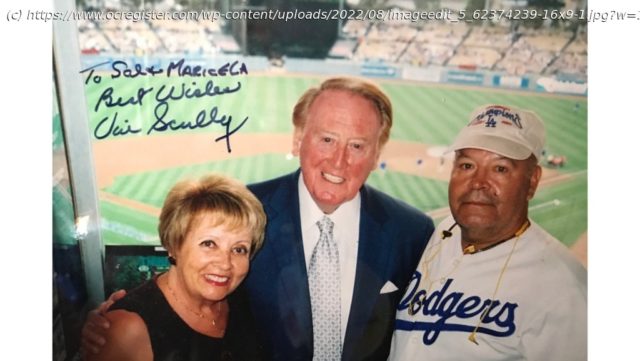The iconic Dodgers broadcaster incited passion and inspired careers, united communities and brought together families across generations.
When Fabiola Torres peers at the 20-year-old photograph of her parents standing on either side of Vin Scully, she sees her father, Salvador Torres, fighting back tears.
On Wednesday, all of Southern California was choked up as we remembered Scully, the Dodgers’ iconic broadcaster who died on Tuesday night at 94.
Scully is revered not only because he’s widely considered the greatest sports broadcaster of all time, but because he was a caring and kind gentleman, and an artist and a teacher whose encyclopedic knowledge incited passion and inspired careers, united communities and brought together families across generations.
And if you look closely, you can see Scully’s out-of-the-park impact in that family picture Fabiola Torres spent much of Tuesday night staring at.
It was taken in the early 2000s, when her cousin Jorge Martin – then the Dodgers’ director of publications – arranged for her father to meet the man whose voice had for decades been the soundtrack in every family car ride and on every weekend spent working in the garage.
Salvador moved to Van Nuys from Mexico to work in 1956, when he was 12, not knowing English – or baseball. But he loved Vin Scully’s voice and he was determined to learn the language, so he began listening to him narrate Dodgers games, enrolling in nightly nine-inning lessons with a velvet-voiced instructor.
“I actually asked my father, ‘What word did you learn?’” Fabiola said. “The word he learned? Ambidextrous!”
As used by Scully, ambidextrous became a baseball term to describe switch-hitters who could bat right-handed or left-handed.
Scully would then always add explanations that made sense to Salvador, and those broadcasts became his “gateway to ‘American culture,’ where he could have a conversation with other fans about baseball and feel included,” said Fabiola, an ethnic studies and women’s studies teacher at Glendale Community College.
But being an English-speaking baseball fan didn’t shield Salvador from harassment and discrimination when he returned from fighting in the Vietnam War, a torment that has stayed with him.
So when Salvador, his earphones draped over his shoulders, met Scully years later, the famous broadcaster didn’t just smile for a picture. He hugged Salvador.
Home
United States
USA — Art Vin Scully was impactful, inspiring: ‘He transcended baseball; he was life’






